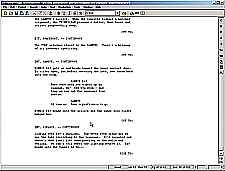
Even the main cast are examples of people who fell through society's cracks. Despite taking place on a galactic scale, it’s paradoxically intimate, both in its storytelling and understanding of how these people get on with their lives. It seems like imagery from New York City circa the 1980s, depicting random denizens with very naturalistic, true-to-life movement, before Spike pops up in the middle of the street and reminds us that the real setting of this opening is Mars. It’s surprisingly down-to-earth, animation director (and character designer) Toshihiro Kawamoto placing a particular emphasis on realistic detail and a sort of cinematic flair in the animation, such as sequences emulating handheld cameras or wide-angle lenses. This continues into its beautiful opening credits, directed by Jin-Roh director Hiyoyuki Okiura.


It’s that, and moments like the opening action sequence of this film, that make it fairly obvious why Cowboy Bebop might feel more conducive to a live-action remake than other anime. Knockin' On Heaven’s Door stands as proof that Spike’s perception of his state of being in a sort of spiritual death can be grafted onto any number of original stories, as screenwriter Nobumoto wholly invents Vincent-a sort of fatalistic mirror image to Spike-for the purpose of the film.
#Movie magic screenwriter 2000 series#
While both seek to expand on that feeling, the new series overelaborates where the film smartly withholds. Unlike the aggressive canonizing of Netflix's new show, Knockin’ On Heaven’s Door understood that Spike’s past was best evoked as an idea, a reality he has since left behind for the waking dream that is his current life. Ed’s whimsicality isn’t so complicated, but as with the others, you get a clear idea of who they are in just a fraction of the time. Even without the benefit of delving into the characters’ past as it did over the course of the series, Nobumoto and the animators still clearly embody the nature of the main cast and the nature of their relationships to each other: Jet’s reluctant but loving patriarchal role, Spike’s carefree attitude stemming from a constant state of existing between life and death, Faye’s equal impulsiveness and stolen chances at happiness. The result is a thoughtful film that keeps the rhythms of the series while still working to its own beat, deliberately paced and compelling.

The quiet and contemplative moments have even more time to linger and breathe, and the action scenes go bigger too. The screenplay by Nobumoto decompresses the tone and structure of a Cowboy Bebop episode to feature length-something that was held against it in some criticism at the time, but an approach that couldn’t be more perfect in hindsight. Here, the crew pursue a mysterious new bounty named Vincent Volaju (who's mentioned in the final moments of Netflix's adaptation), a man threatening a bioterrorist attack in a capital Martian city.

Knockin’ On Heaven’s Door isn’t technically a follow-up as it’s placed “between” the 22nd and 23rd episodes, maintaining the decisiveness of the show’s spectacular and heartbreaking finale.
#Movie magic screenwriter 2000 movie#
Those, plus Watanabe's music dramas Kids on the Slope and Carole & Tuesday, are all great for their own reasons, but the Cowboy Bebop movie remains one of the finest works by this particular collective of artists.Īs with the series, the film takes place in the year 2071, following the ragtag, frequently flat-broke crew of bounty hunters residing on the spaceship Bebop: former triad enforcer Spike Spiegel, gambler and con-woman Faye Valentine, ex-cop Jet Black, the oddball hacker Radical Edward, and the super-intelligent corgi Ein. Since the show ended, Watanabe and screenwriter Keiko Nobumoto left Cowboy Bebop untouched as a singular story, only revisiting it through shared themes and anachronistic genre mash-ups with Samurai Champloo and the eclectic, experimental pulp sci-fi adventure Space Dandy, both reimagining the scrappy, adversarial found family as seen in Bebop. It’s been 23 years since the release of Cowboy Bebop, the beloved anime series created by Shinichiro Watanabe, and 20 since its interquel movie Cowboy Bebop: The Movie, or Cowboy Bebop: Knockin’ On Heaven’s Door, in Japan.


 0 kommentar(er)
0 kommentar(er)
